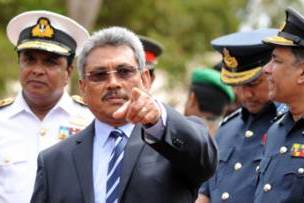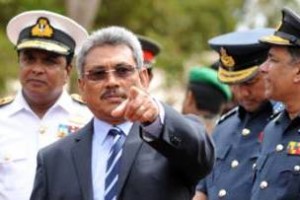Laksiri Fernando
The interview given to the Daily Mirror (4 July 2013) by the Secretary of Defence, Gotabhaya Rajapaksa, may be candid as the reporter has prefaced, but not helpful to resolve the post-conflict issues or reconciliation in Sri Lanka. Moreover they raise questions about his political/military ambitions which should be concerns for the democracy in the country. He was fairly a good Defence Secretary during the war but not after. Instead of defending the country or the people as a total he now defends the majority domination of his own ethnic community over the minorities, identifying himself as a ‘Sinhala Buddhist.’
Our failure to device devolution, even after the BC and DC Pacts or revise the 13th Amendment in a positive manner after the Indian mediation, is not India’s fault but our own. Although the Defence Secretary has blamed J. R. Jayewardene for antagonizing India in the ‘80s now he is doing the same and much worse by being a demagogue for the extremist nationalist sections of the country.
During the interview he once wanted “to take the country as one citizenry” without ethnic distinctions and then claiming “these issues arise only because you are either Tamil or a Muslim and blame a Sinhalese government.” Like the JHU or the BBS he belongs to a breed of extremists who wanted to deny that the minorities have any grievances as minorities. This smacks the international understanding of the issue globally, the UN even having a specific Declaration (1992) and many other mechanisms in the protection of minorities. If one wants to identify the key human rights issue in Sri Lanka today then that is undoubtedly the minority rights issue.
Denial of Minority Grievances
He took pains to claim that all problems are the same for all communities and the minorities do not at all have any grievances without even realising that the country’s Defence Secretary talking in this manner itself is offensive for the minority communities both ethnic and religious. To support his point of view he wagged the age old arguments asking the questions back “who are the top businessmen in this country? Is there a restriction in terms of education for the minorities in this country? Is there any sort of restriction for a Muslim or a Tamil to enter university?” and so on.
What he has conveniently suppressed were the facts that nearly a million Tamil plantation workers were denied the citizenship in 1949, only the Sinhala language was made the official language in 1956 and standardization schemes in 1970s disadvantaged the Tamil youth to enter the universities, not to speak of the BBS type goons with whom he has close connections today physically attacked the minorities and particularly the Tamils in 1958, 1977, 1979, 1981 and 1983 with considerable loss of life. As the Defence Secretary he is duty bound to protect the security of the minorities same as the majority community and in this connection should know the history without ethnic prejudices.
He also should know that the accord of foremost place to Buddhism in the Constitution is a denial of equality for minority religions. There is no dispute with him on my part however that what the LTTE indulged in as terrorists is equally or more horrendous but that could not be an excuse to deny the reasonable demands of the minorities in the country, whether Tamils, Muslims or Christians. He and/or his brother President should take the direct responsibility for the recent attacks on the religious and business establishments of particularly the Muslim community and there are all indications that these incidents happened with their full awareness if not approval. It is very clear that he is not expressing his views impartially but on behalf of the Sinhala extremists. The following is an example in noting the last sentence particularly.
Also it must not be forgotten that in many developing countries, most of these issues are not confined to the minorities. It is not that they go through these issues alone and it is not that they face these issues because they are minorities. Upon close analysis, at times, it would be clear that the majority community faces these issues more acutely than the minority communities.
He has asked the question “When 78% of this country comprises Sinhalese how does such a vast landmass in the North become 98% Tamil. Isn’t this unnatural?” In the first place his figures are utterly wrong when he says that the Sinhalese percentage is 78 per cent. According to the recent census figures (2012) it is 74.9 per cent and in 1981 it was 73.9 and in 1946, 69.4. This cannot be a typographical error since the same figure appears twice and the figures given for the Tamils and Muslims are 10 and 8 per cents respectively.
The fact that the Northern Province is predominantly Tamil is a historical reality while he is correct in saying that there had been efforts on the part of the LTTE to drive away the Muslims and also the Sinhalese although the Sinhalese presence in the province was not that high even before the conflict. But most alarming is his conclusion. He has said “If normalcy prevailed this entire situation would have changed. It is nothing but true and correct that in the North and East there must be the same percentage of the majority community” (My emphasis).
It is necessary to ask whether this is the government policy in ‘resolving the ethnic problem’ by converting the North and the East as majority Sinhalese provinces?
It is alarming to see that this proposal has come from the Defence Secretary who is the brother of the President and who has large numbers of armed forces stationed in these two provinces. If he is only a public servant he should not have come up with these suggestions or the interpretations or rather the misinterpretations that he has given on the ethnic question. He has talked a lot on demographic matters quite prejudicially and incorrectly. No need to say that any effort at forceful population transfers to alter the ethnic balance in the North or the East borders on racism.
Against Devolution
His main assault in the interview has been on devolution in the background of extremist sections clamouring for the complete abolition of the 13th Amendment and devolution at the verge of the promised elections to the NPC. There is no question in my mind that the Indian involvement in the 13th Amendment, which was necessary under the circumstances in 1987, is a disadvantage in defending it among the average citizen in the country. However, if we are not frogs in a narrow well, we also should understand that many overlapping political issues in the world are resolved through mutual understanding and agreements between neighbouring countries.
Devolution should be there not because of India but because it is the right thing to do in the direction of resolving the ethnic question as well as democratizing the country. It is not an administrative device or it shouldn’t be so. It is not a panacea either. It is a mechanism for giving the people in the provinces including the ethnic communities necessary autonomy or self-governance in managing their affairs on an agreed basis. If there have been some failures on the part of the Provincial Councils that have been primarily due to the half-hearted policies at the Centre and not allocating enough funds for their affairs.
Our failure to device devolution, even after the BC and DC Pacts or revise the 13th Amendment in a positive manner after the Indian mediation, is not India’s fault but our own. Although the Defence Secretary has blamed J. R. Jayewardene for antagonizing India in the ‘80s now he is doing the same and much worse by being a demagogue for the extremist nationalist sections of the country. If Mahinda Rajapaksa had taken steps to implement the recommendations of his own appointed APRC then by now the Indian element of the devolution could have been taken away. No one disagrees that better solutions are ‘home grown’ ones if at all possible and willing.
On the specific issue of the importance of constituting the NPC for the Tamil issue he has argued that “If this is the argument and if this is the theory- that devolution would solve the problem, I want to know how it solves the issues of the Tamils living in the Central Province who live without any concerns under a Sinhalese Chief Minister.” It appears that the Defence Secretary does not have the common sense or the patience to realize that in resolving or in trying to resolve a problem in one area or a sector does not necessarily mean that all the problems in others area would automatically be resolved. This is why bipartisan or bi-ethnic (cross-ethnic) approaches are necessary in provincial administration and some have even suggested committee system of government of the Donoughmore type. In contrast, the Defence Secretary’s approach seems to be like a ‘total solution or none at all.’
In denying the validity of devolution in Sri Lanka, the Defence Secretary has taken the example of Singapore. At the begging of the 19th Century, Singapore was just an ‘entre port’ with few thousand people. It is now a ‘city-state’ with around 700 sq. km. and little over 5 million people. Nearly 200 sq. km are reclaimed. Over 2 million people are not born in Singapore and others are first or second generation migrants. No one is asking for devolution for the Colombo city! Of course the ethnic groups are intermingled or intermixed in this small place and even that is in relative terms. That could be an inspiration but not a model solution for Sri Lanka. If the Defence Secretary intends, even in his dreams, to implement population transfers to look Sri Lanka like Singapore, then it would tantamount to Hitler’s policy (in reverse order) after conquering Poland in 1939, ‘a new order of ethnographic conditions.’
If the Defence Secretary has concerns about giving police powers to the provinces it may be a valid concern in terms of defence. But while being a Secretary to a Ministry, and also accusing the minority politicians for messing up the ethnic issue, for him to come up with erroneous demographic interpretations and accusing the minority communities on behalf of the majority community is not suitable for a public servant. How can the people think as ‘one nation,’ as he claimed to be the solution for the country’s problems, when the most powerful Defence Secretary talks on behalf of the majority community? It appears that he has very clear political ambitions and if that is so he should resign or he should be removed. He can even contest the PM position in the NPC on behalf of the SLFP or the UPFA.
Or otherwise there can be valid suspicions that he keeps the defence portfolio in order to prepare for a military takeover aligning with the Sinhalese extremist groups like the JHU and the BBS.
On the question of recent spate violence against the Muslim and Christian communities, within a background of much boasted peace and stability after the end of the war in May 2009, the Defence Secretary has said “I’m not defending the Bodu Bala Sena but most of these things were not done by them; it was rather because of local tensions within these areas.”
– Sri Lanka Gaurdian

